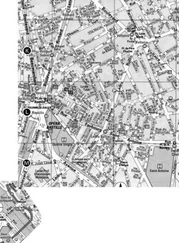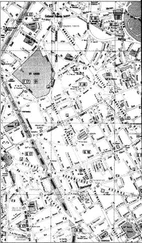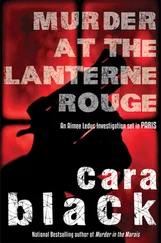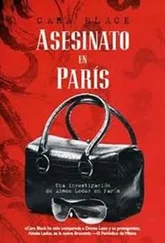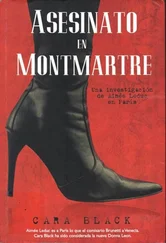Maybe they still did?
What if Thadée let old vets live there, or rented them rooms? That could be the connection!
No one answered the door, and the place looked deserted.
She tried René’s number as she had all night. No answer.
Then her cell phone rang.
René’s kidnappers? Her heart leaped and she looked at her Tintin watch. If she told Léo the time, it might help her track the call.
“Mademoiselle Leduc,” said a clipped voice. “Commissaire Ronsard would like to speak with you.”
Her heart sank. Ronsard from the Brigade Criminelle quartered in the Préfecture De Police at Quai des Orfévres. How had he found her?
“Concerning?”
“He’ll expect you within half an hour, Mademoiselle Leduc.”
AIMÉE STOOD in the Brigade Criminelle outer office by a scuffed mustard-colored door. Wet wool, unemptied ashtrays and the sad smell of fear kept her company. She shivered, staring at the ancient brown-tiled floor and the yellowing announcements on the faded green walls. Thick, webbed skylights let in gray diffused light.
A NO SMOKING sign hung above the metal desk and a scratched billy club lay next to binders of the staff shift schedules and a log labelled SICK DAYS.
A bored zigzag , a low-ranking officer with three stripes, passed by.
She tapped her high-heeled boot, smoothed down her leather skirt. The chilly waiting room felt like the polar ice cap. And the frigid glare of the young uniformed receptionist, who insisted she empty her pockets and bag twice before passing through the metal detector, didn’t help.
“Mademoiselle Leduc,” she said, at long last, “go in.”
Aimée passed a vaulted window in the long corridor. Below, the Seine snaked, pewter and dark khaki, under the overcast sky.
“You wanted to see me, Commissaire Ronsard?” she said, entering his office.
Commissaire Ronsard nodded. “ Un moment ,” he asked, handing a uniformed flic a red labeled file: evidence complete and ready for la Proc’, the Prosecutor.
The Brigade Criminelle boasted of their 72 percent solved-case rate. That didn’t include the banlieue, suburbs with high-rise concrete projects that the brigade didn’t police—or care to. Even the Paris flics avoided them.
She noted the wooden desk with stacked folders, two folding metal chairs, and photos of former department chiefs lining the mustard colored walls—one very familiar to her. Bound manuals of the Code Civil sat on a window ledge.
“Tell me about your relationship with Thadée Baret,” Ronsard said, indicating a wooden chair.
“Relationship?”
“Were you l’autre femme? ”
Quaint, the old expression for the other woman.
“Not at all.” She stuffed her anger. “Why ask me?”
“But Mademoiselle, you lured him to the phone cabinet,” he said, as if she hadn’t spoken. “Accosted him. Bystanders heard you shouting. Said he seemed desperate.”
“Thadée was desperate, Commissaire,” she said, keeping her voice patient. “How did you get my name?”
“Bystanders heard you identify yourself,” he said.
“Of course, I stood—”
“Right here,” he interrupted, pulling down a screen with a diagram of rue des Moines. The half-moon-shaped square, the boulangerie and the phone cabinet were outlined in blue. Polaroid photos of Thadée’s body from various angles were tacked up beside the diagram. She winced. Thadée resembled a twisted broken doll.
“Commissaire,” she said, “he told me someone was following him. And I know he waited for my call in a café. Perhaps his phone was tapped. On top of that, my partner René Friant has been kidnapped.”
“Mademoiselle Leduc, that’s the first I’ve heard about it.”
“The kidnapper wants this.” She showed him the fifty-thousand franc check. “They said Thadée owed them. If I didn’t pay, they’d dismember my partner.”
“Did Thadée Baret say something to anger you?”
Why was he obsessed with that?
She shook her head. From the walls dampness emanated through the rectangular office. Goosebumps went up her arms.
“You yourself admit you pushed him into the line of fire.”
“Don’t you understand?” she stood up, paced closer to the diagram. “I’d never even met him. If I planned on killing Thadée, I wouldn’t lure him into a crowd to be the target, too. But if someone wanted to stop him talking, it was the perfect way to eliminate him and throw the blame on me.” She stared at the commissaire. “You know that as well as I do.”
She watched his face. Did a flicker of understanding cross it? She figured right now he had no other leads so he’d jumped on her.
“ Au contraire ,” he said. “A witness heard you threatening him. Saw you push him.”
How convenient. She wondered if they’d find this witness again. She was glad she kept the information about the jade to herself.
“Like I said, I told him to duck, but too late. What can you do about my partner, René Friant? Commissaire, I’m not a civilian.“ She walked to the wall, pointed to the photo of a tall man, with a gray mustache and sharp eyes. “That’s my grand-père . He left the Deuxième Bureau, as they used to call this section, and started Leduc Detective.”
Commissaire Ronsard would listen to her now, wouldn’t he? He pulled at a loose thread from his jacket, then looked away.
“Mademoiselle, how do you explain Baret’s ex-wife Sophie’s disappearance?”
“Disappearance?” Aimée asked. “That’s a question for you to answer, Commissaire,” she said. “She had been assaulted in her home and tied up. I cut her down from the toilet pipe, otherwise—”
“ Attendez .” He opened a folder, took out more Polaroids. “A courtyard resident called last night and said he saw you carry a struggling Sophie to a taxi.”
The graphic artist.
“But I was helping her.”
“Then where is she?”
Should she tell him? But he didn’t seem to believe anything else she said. And she worried for Sophie’s safety.
“Sophie checked into a clinic to rest, she seemed distraught.” A small fib.
“We need to question her.”
Sleet silvered his office window, sheeting the barges in the Seine in a gray mist. The office temperature matched the dampness outside.
“Commissaire, that’s for you to arrange.”
“I can keep you in garde à vue until you cooperate,” he said. A garde à vue would smell of unwashed socks, vomit, and urine, on a good day.
“Clinique Parc Monceau,” she said. “At least I dropped her off there.”
She knew someone would check. That’s why she’d made a reservation there on her cell phone from the taxi the previous night.
“Why didn’t you help her register at the clinic?”
“Commissaire, she didn’t want my help,” she said.
“We found this in the gallery,” he said, slapping it on his desk. “Does this look familiar?”
Aimée’s black wool scarf.
Great.
“ Merci, this must have fallen when I helped her,” she said.
“But Sophie Baret never checked in. We consulted all the registers at clinics and hopitals. Standard procedure. Found a reservation but Sophie Baret didn’t check into the clinic. Matter of fact, her name appears on an Orly flight manifest to London.”
“London?”
“On an Air France flight. How do you explain that, Mademoiselle?”
Wasn’t she still at Morbier’s? “That’s news to me.”
“So you took her to the airport,” he continued, “or made it appear that way.”
“Commissaire, I had no idea—”
“Did you silence her , too?” he interrupted.
Читать дальше


